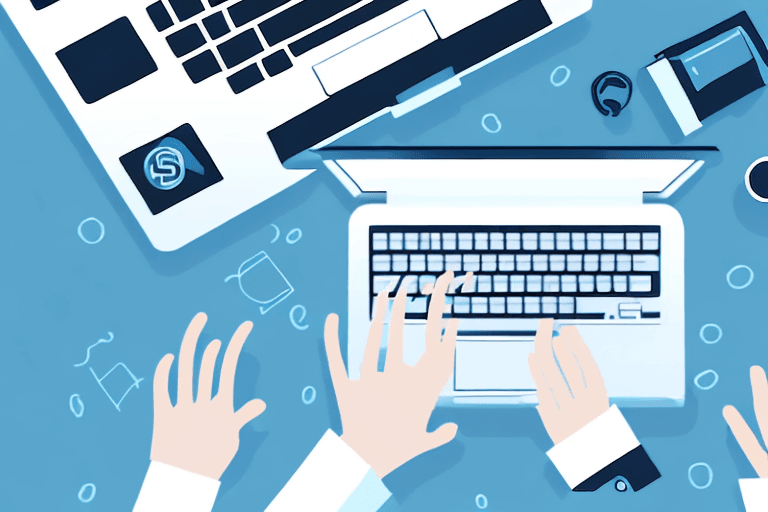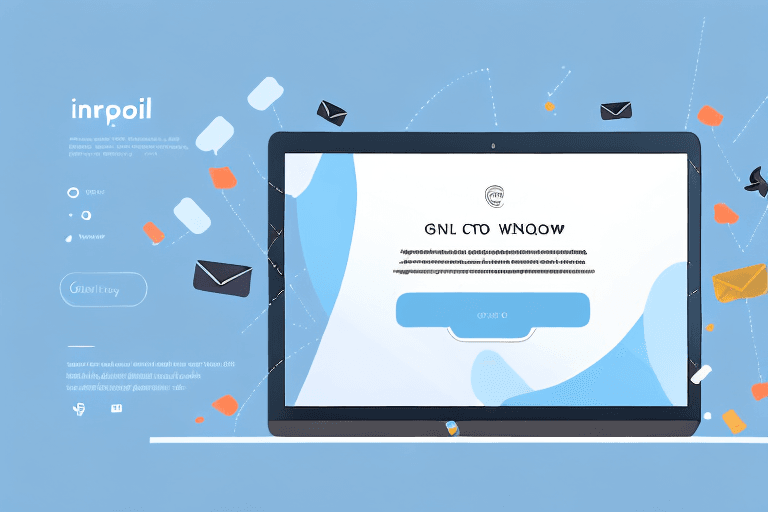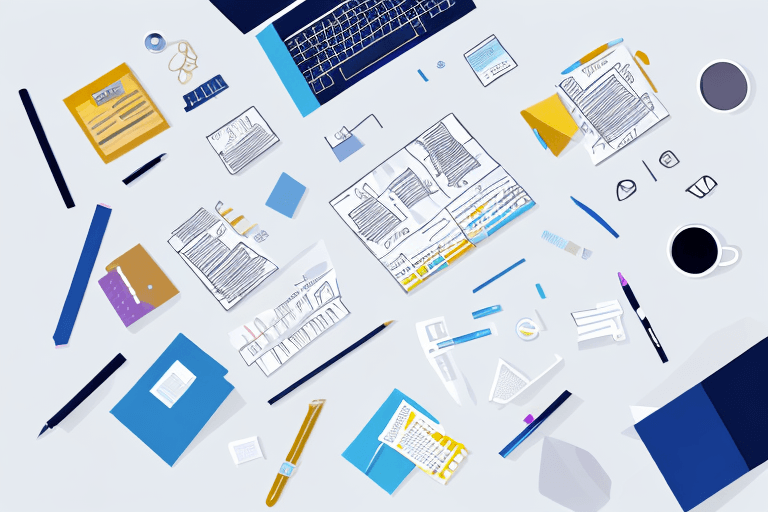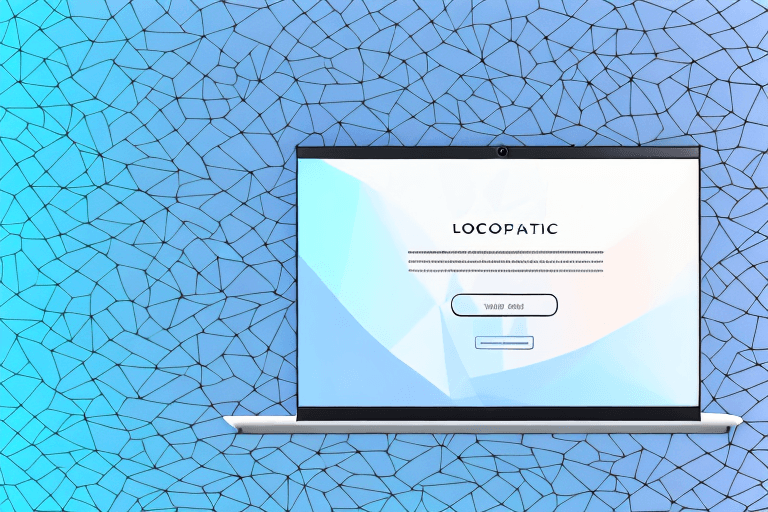Interviewing for a job can be nerve-wracking, but the process doesn't end once you walk out of the room. Following up with a well-crafted email can be the key to standing out from other candidates and landing the job. In this article, we will cover the key elements to consider when crafting an effective interview follow-up email template.
Understanding the Importance of a Follow-Up Email
Why is a follow-up email so important? There are several reasons. It shows that you are interested and engaged in the position and company. It also gives you the opportunity to express gratitude for the opportunity to interview and reinforce your qualifications. However, one of the most significant reasons is that it sets you apart from other candidates who may not take the time to follow up.
When it comes to the job search process, it's important to remember that hiring managers are often looking for candidates who are not only qualified for the position, but also demonstrate a high level of professionalism and initiative. By sending a follow-up email, you are showing that you are willing to go above and beyond what is expected to make a good impression and stand out from the crowd.
Why a follow-up email matters
Simply put, a follow-up email can make or break your chances of getting the job. Hiring managers receive a flood of applications, and even for the most organized and efficient of them, it can be challenging to keep all the candidates straight. A follow-up email can remind them of your qualifications and keep you top of mind.
Additionally, a follow-up email can help to establish a personal connection with the hiring manager. This can be especially important if you are applying for a job in a competitive field or industry where there may be many qualified candidates vying for the same position. By taking the time to send a thoughtful and well-crafted follow-up email, you can help to set yourself apart from the competition and increase your chances of landing the job.
The impact on your job prospects
Not sending a follow-up email can make you appear disinterested, unprofessional, or both. At the very least, it signals that you are not willing to put in the extra effort that is often required to land a job. Think of it this way: if all other things are equal, the candidate who sends a follow-up email will likely be the one who lands the job.
However, it's important to remember that the follow-up email should not be seen as a guarantee of getting the job. While it can certainly help to improve your chances, there are many other factors that come into play during the hiring process. That being said, by sending a well-crafted follow-up email, you can help to ensure that you are doing everything in your power to make a good impression and increase your chances of landing the job.
Key Elements of an Effective Follow-Up Email
The key elements of an effective follow-up email include the subject line, personalization, expression of gratitude, reinforcement of qualifications and interest, and a call to action. However, there are a few more things you can do to make your follow-up email stand out.
Subject line
The subject line should be clear and straightforward. Avoid using gimmicks or any language that could be misconstrued as spam. Consider including the job title or a reference to the interview in the subject line to ensure it catches the recipient's attention. For example, you could try something like "Following Up on Marketing Manager Interview."
Personalization
Personalization can take many forms, but it should always be present in a follow-up email. Address the interviewer by name, and if possible, reference something specific from the interview to show that you were paying attention. You could mention a project the company is working on that you find interesting or a common interest you share with the interviewer.
Expressing gratitude
Thank the interviewer for the opportunity to interview, and if appropriate, mention something specific that you appreciated. For example, if the interviewer took the time to answer a question or provide more information about the company, acknowledge that. You could also express your gratitude for the interviewer's time and consideration, as you understand how busy they must be.
Reinforcing your interest and qualifications
Use this opportunity to remind the interviewer of your qualifications and express your continued interest in the position and the company. Reference specific skills or experiences that align with the job requirements. You could also mention any additional research you have done on the company since the interview and how it has further solidified your interest in the position.
Call to action
End the email with a clear and concise call to action. Express your interest in next steps, ask about the timeline for hiring or if there are any additional steps you can take, and offer to provide additional information if needed. You could also ask if there is anything else you can do to demonstrate your qualifications or enthusiasm for the position. Remember to keep the tone of your email positive and professional, and avoid coming across as pushy or desperate.
By following these tips, you can craft a follow-up email that stands out from the rest and helps you make a lasting impression on the interviewer.
Timing Your Follow-Up Email
The timing of your follow-up email can be just as important as the content. You want to strike a balance between being too aggressive and being forgotten. A well-timed follow-up email can show that you are proactive, interested, and enthusiastic about the position.
When it comes to the timing of your follow-up email, there are a few things to consider. First, it's important to send the email promptly. You don't want to wait too long and risk the interviewer forgetting about you. On the other hand, you don't want to come across as too pushy or desperate.
When to send your email
Send your email within 24 to 48 hours after the interview. This timeframe shows that you are interested and engaged while allowing the interviewer time to process and make notes about the candidates. If you wait too long, the interviewer may assume that you are not interested in the position or have already accepted another offer.
Timing is especially important if you are applying for a competitive position. If you wait too long to follow up, another candidate may beat you to the punch and secure the job.
Factors affecting the timing
However, the timing can also depend on the company culture or the specific hiring process. If the company has a shorter or longer timeline for hiring, adjust your schedule accordingly. You can also ask the interviewer at the end of the interview about the timeline for the hiring process or when you might expect to hear back.
Another factor to consider is the time of day that you send the email. Sending it early in the morning or late in the evening may make it more likely to get lost in the interviewer's inbox. Aim to send your email during regular business hours to increase the chances of it being seen and read.
Finally, keep in mind that the content of your email is just as important as the timing. Be sure to thank the interviewer for their time, reiterate your interest in the position, and highlight any relevant skills or experience that you have. A well-crafted follow-up email can make a big difference in the hiring process.
Crafting the Perfect Follow-Up Email Template
Crafting the perfect follow-up email template takes time and effort, but it's well worth it. A well-crafted follow-up email can set you apart from other candidates and show that you are committed to the job.
It's important to remember that a follow-up email is an opportunity to reiterate your interest in the position and to showcase your skills and qualifications. A well-written follow-up email can make a big difference in the hiring process.
Greeting and introduction
Start your email with a personalized greeting that addresses the interviewer by name. This shows that you have taken the time to research and personalize your message. Use a formal greeting such as "Dear Mr./Ms." followed by their last name.
Next, briefly introduce yourself and reference the job position. You can mention something specific that you discussed during the interview to help jog the interviewer's memory.
Body of the email
The body of the email should include the key elements outlined earlier: expression of gratitude, reinforcement of your qualifications and interest, and a call to action. However, it's important to also include some additional information that will set you apart from other candidates.
You can mention any relevant experience or skills that were not discussed during the interview. This is an opportunity to showcase your strengths and show the interviewer that you are the best candidate for the job.
You can also include a brief paragraph about why you are interested in the company and the position. This shows that you have done your research and are genuinely interested in the company and its mission.
Closing and signature
Finally, close your email with another thank you and a professional signature. Include your name, contact information, and any relevant social media links or portfolio websites.
Remember, the goal of a follow-up email is to leave a lasting impression on the interviewer and to show that you are the best candidate for the job. Take the time to craft a well-written and personalized email, and you will increase your chances of landing the job.
Conclusion
Now that you know the key elements to consider when crafting an effective interview follow-up email template, it's time to put that knowledge into action. Remember, a follow-up email can be the key to standing out from other candidates and landing the job. Take the time to personalize your email, express gratitude, reinforce your qualifications, and give a clear call to action. With these elements in place, your follow-up email could be the deciding factor in getting the job of your dreams.




